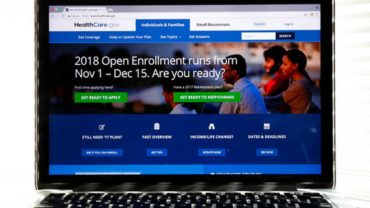Free health insurance?
The idea seems like a relic from decades ago, when health care was relatively cheap and big corporations offered rich health benefits to employees.
But reports say that for 2018 coverage, there is an increased availability of zero-premium health plans nationally in the insurance exchanges created by the Affordable Care Act.

Angela Hutchins of Summerville, in northwest Georgia, has just enrolled herself and her husband in an exchange plan for next year that has no premium. And it’s a “gold’’ plan that has fuller benefits than the lower-tier “bronze’’ and “silver’’ plans.
Hutchins said this week that the couple has had no health insurance the last couple of years. They are beef cattle farmers, and also run a local food bank as volunteers.
“My husband and I are 40 and 41,’’ Hutchins says. “We need to have some regular exams. We need insurance just in case one of these exams comes back not so positive.”
The zero-premium plan “was a shock to me,’’ she said.
Though there are no premiums for their insurance, the couple are not getting ”free” health care. They will have a family deductible of $4,500 a year.
The widely publicized premium increases on the exchanges are part of the reason for the cheaper plans. Those hikes have caused corresponding increases in the tax credits that help people earning up to 400 percent of the federal poverty level to pay their premiums.
For 2018, premiums are going up by up to 57 percent in Georgia, in part because the Trump administration has cut off the cost-sharing reductions for lower-income consumers.
Those making over 400 percent of poverty, meanwhile, will feel the brunt of those premium hikes because they don’t qualify for subsidies.
The Kaiser Family Foundation recently reported that the particularly large increase in premiums for silver plans means that eligible enrollees will see much higher premium tax credits. These large credits make gold plans more easily attainable and make bronze plans much cheaper or even available at no additional premium.
But the situation that has created a good deal for some people is not welcome news for others.

“These 2018 premium figures are striking because they show the gap is widening between the health insurance haves and have-nots,” said eHealth CEO Scott Flanders in a statement. “As costs continue to increase aggressively and the dollar value of premium subsidies keeps pace, many lower-income persons will now have access to health insurance coverage with zero-dollar premiums while middle-income families who don’t qualify for subsidies may be required to pay the equivalent of a second mortgage for the same coverage. This is not a sustainable model for a health insurance market intended to serve the needs of all Americans.”
The insurance exchanges were designed for people, like the Hutchins couple, who don’t get job-based or government health insurance.

The Wall Street Journal reported an analysis of newly available federal data on healthcare.gov that found in nearly all of the 2,722 counties studied, some consumers will be able to obtain free health insurance because they qualify for larger federal premium subsidies that cover the full cost of a plan.
Free bronze plans have been available previously, but their prevalence has increased significantly in 2018, according to the consulting firm Oliver Wyman, which analyzed the federal data.
Russ Childers, an insurance agent in Americus, in southwest Georgia, said Tuesday that his agency has a few clients with zero premiums. He cites the case of a 23-year-old college student earning $13,000 a year. If she picks a silver plan, he says, “she pays zero premium.’’ And her deductible is just $300 a year.
The agency’s Susan Ruckman said she has never seen a gold plan with zero premiums before this year.
Insurance companies hope the no-premium insurance draws in more enrollees, particularly the kind they need most — people with few health issues — the Journal reported. Healthy consumers help bolster the stability of the insurance market by balancing out the health care costs of sicker enrollees.
Marc Jenkins of Insure Georgia, an organization of insurance navigators, said many consumers are not choosing a free bronze plan because the deductible with that coverage is so high.

Jenkins helped Angela Hutchins sign up for her gold plan.
“Insurance always seems to me like muddy water,’’ Hutchins said. She added that she and her husband had postponed going to the doctor for routine tests.
This year, the couple felt they needed the extra security.
“Just in case, we wanted to have a policy.”


